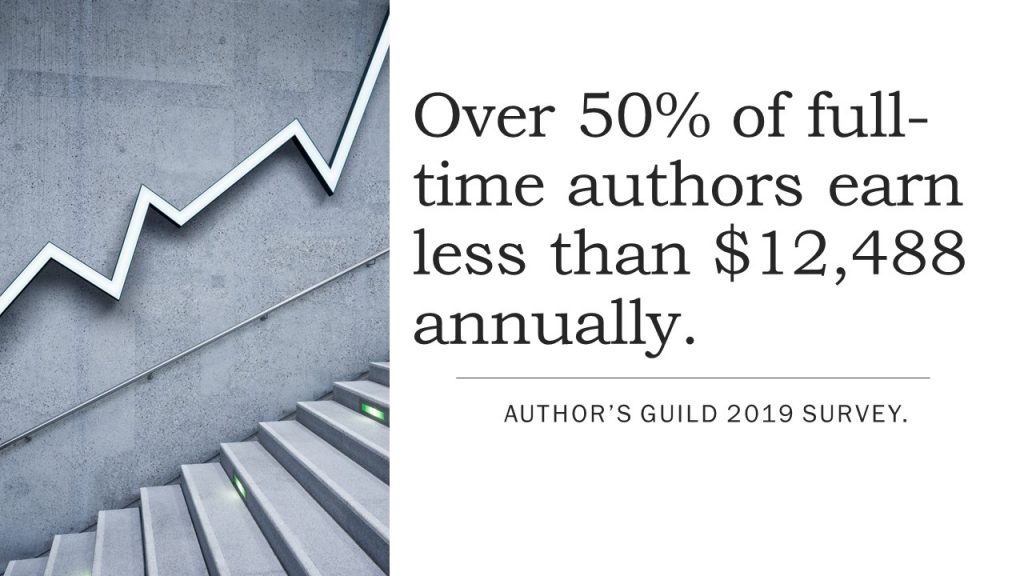Write a book, get published, make millions, right? Wrong.
I’m not sure what bothers me more about this misconception: the would-be authors who think a book deal is the key to financial success and easy living or the countless readers who operate under the delusion that authors are so well off that they ought to give their books away, for free.
Authors Earn Less than Minimum Wage
The Bureau of Labor Statistics list average annual income for writers and authors as $63,200. What many writers and readers fail to realize is, this average includes the salaries of corporate writers who are responsible for crafting the limitations for your insurance and warrantees, the microscopic legalese that’s included with the terms and conditions of your credit card, and the impossible to follow instructions included with every “assembly required” item you’ve ever purchased. Actual author income is much, much less.
The 2018 Author’s Guild Survey reported that median author income dropped by half between 2007 ($12,850) and 2017 ($6,080). Of that amount, book income accounted for only $3,100. The remainder of the authors’ income was attributed to other writer-related activities: teaching classes as an adjunct, speaker fees for lectures and workshops, paid magazine, newspaper, and journal articles, blog posts, book reviews, and selling their own book related merchandise. For self-published authors the outlook was even worse. Median book-related income for self-publishers was only $1,951 annually.
This is not surprising given the constant clamor for free books. Pressures from Amazon to offer ebooks for free in order to garner higher sales rankings depresses earnings even further. The sad truth is, each year 25% of all published authors (and 18% of full-time authors) earn $0 in book related income. Those with $0 in earnings were not included in the Author’s Guild calculations above. Including the zero dollar earners brings median author earnings down to $1,784 annually, with book earnings accounting just $490, on average.
 The 2019 Author’s Guild Survey painted an even bleaker picture. Half of all full-time authors earn less than $12,488 per year. That works out just $6.00 per hour, 40 hours a week, all 52 weeks of the year, and comes without the benefit of retirement, sick pay, vacation days, or health insurance.
The 2019 Author’s Guild Survey painted an even bleaker picture. Half of all full-time authors earn less than $12,488 per year. That works out just $6.00 per hour, 40 hours a week, all 52 weeks of the year, and comes without the benefit of retirement, sick pay, vacation days, or health insurance.
Despite the fact that 52% of published writers surveyed have advanced degrees, the majority of authors actually earn less than federal minimum wage. This highlights the plight of gig workers who must cobble together multiple part-time jobs and contract work. Only 21% of full-time authors earned 100% of their income from book sales, the rest were forced to hold a second (and sometimes a third) job.
Legalized Slavery
Every person should ask themselves, what good is a higher Amazon sales rank if the gross receipts from those sales amounts to ZERO dollars?
Refusing to pay someone for their labor is illegal in most industries. It should be illegal in publishing, too. Authors tied to publishing contracts that require them to produce subsequent works, all for the grand total of $0 in royalties, have essentially sold themselves into bondage. And it’s not just the authors who suffer, it’s the whole industry.
Many readers do not realize there is a staggering number of people involved in birthing a book, starting with the author and ending with the bookseller. These folks often need paid before the book can advance to the next stage of publication. Below is a partial list of the people included in an author’s book publishing team:
- Author
- Author’s Agent
- Content Editor
- Copy Editor
- Proof Reader
- Graphic Designers
- Bowker (For ISBNs & barcodes)
- Library of Congress Staff (for LCCN, CIP, Cataloguing)
- Copyright Office
- Book Binders
- Shippers
- Book Reviewers
- Marketing and Advertising staff
- Publishers
- Warehouses and Distributors
- Booksellers (and their staff)
Of this list, the author, agent, publisher, warehouse/distributor, and bookseller do not receive any income until after the book is sold. Most traditionally published authors never earn enough to cover the cost of publication and therefore earn no royalties. This is precisely why 25% of all authors earn $0 in book income annually. By paying everyone else ahead of themselves, many self-published authors actually slip further into debt with each book they publish, tying themselves to an industry (and readers) who demand free books.
What can be done?
For starters, authors need to stop giving their books away. Free books not only depresses the prices for all other books, but generates the expectation that books can (and should) be available at no cost.
Readers need to understand that just because they didn’t pay for a book, doesn’t mean it’s free. Someone paid on their behalf and that someone was likely the author. Ebooks are not free to produce and should not be free to consume. The costs for editing, graphic design, copyright registration, marketing, etc., do not magically disappear just because a book comes in digital format rather than being print and bound. Authors (and everyone else involved in the publishing process) are not slaves. They deserve to be paid for their labor.
It’s time to abandon platforms that pressure authors to offer their works without pay. Celebrate your local, independent bookstore. Pay for the books you read and fancy yourself an abolitionist because requiring authors to work without pay is a practice that ought to be abolished.

AGREE! I am always asked to write newsletters and copy for free because “you’re a writer” — I refuse because it devalues the work we do and this harms writers, even if I love the organization or cause.
Thanks for valuing writers, Khaliela!
I spent some time on the phone with the folks at the Small Business Development Center this morning. I just learned that even if an author gives their books away “Free” they are still on the hook for the sales tax owed to the state for the value of the product.
So, if I give you a $20 book, FREE, I then have to fill out a form and mail it to the State of Idaho with a check for $1.20.
Next time someone asks you for something “free” you might consider asking them if they will do the paperwork and send the tax to the State on your behalf.